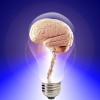You may have heard of TMS or transcranial magnetic stimulation, a non-invasive form of therapy that transmits electromagnetic impulses to targeted regions of the brain. The practice of using electric current therapeutically has been around for centuries.
According to PBS, “electric eels and fish were used by people in ancient times to treat headaches and mental illness.” Most commonly, TMS therapy has been used to treat those that have been non-responsive to more traditional antidepressant treatment. The method is a relatively new one, which was approved by the
Food and Drug Administration in 2008. As with most new medical discoveries, it has been the subject of several studies to test its effectiveness.
Magnets and Memory Study
Recently,
researchers at Northwestern University have released some promising results that suggest that TMS therapy can improve memory. Study participants did 20 minutes of the therapy for five consecutive days and then underwent MRI scans and memory tests. After three days of the therapy, participants started to remember face-word pairings better than before, suggesting that their cognitive memory had strengthened as a result of TMS. The researchers believe that the subsequent MRI scans of the brain further support their findings.
One of the main takeaways from the study’s researchers is that the TMS therapy didn’t necessarily improve participants’ memories as much as
it strengthened parts of the brain and allowed them to work more efficiently together. Furthermore, researchers believe the results of this study could lead to more studies that investigate the possible use and effectiveness of TMS therapy to treat conditions like Alzheimer’s and schizophrenia.
In general, the use of magnets in the medical technology and the field is an interesting development. However, transcranial magnetic stimulation is still in the early stages of development and testing, so it is not yet ready to offer to the average consumers. For more information on the study, you can
find the abstract here.

